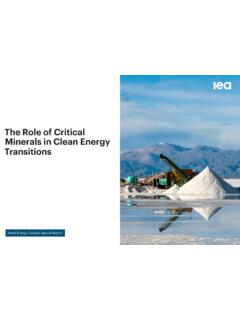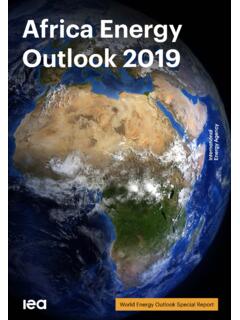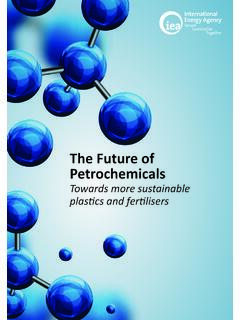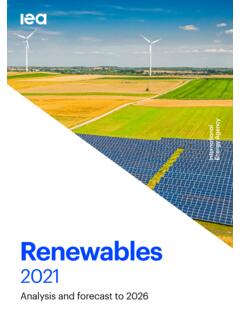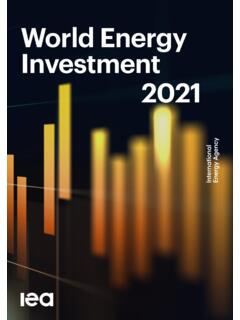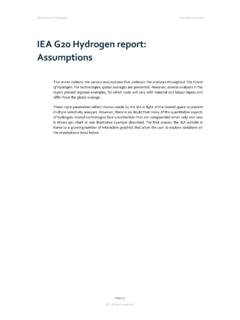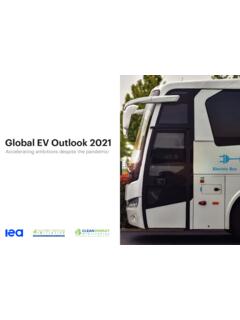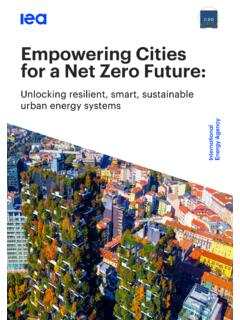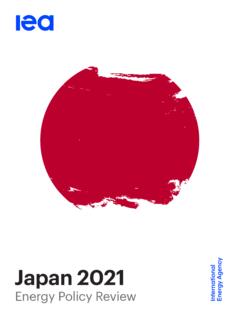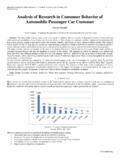Transcription of The Future of Cooling
1 The Future of CoolingOpportunities for energy- efficient air conditioningTogetherSecureSustainableThe Future of CoolingOpportunities for energy- efficient air conditioningINTERNATIONAL ENERGY AGENCYThe International Energy Agency (IEA), an autonomous agency, was established in November 1974. Its primary mandate was and is two-fold: to promote energy security amongst its member countries through collective response to physical disruptions in oil supply, and provide authoritative research and analysis on ways to ensure reliable, affordable and clean energy for its 29 member countries and beyond. The IEA carries out a comprehensive programme of energy co-operation among its member countries, each of which is obliged to hold oil stocks equivalent to 90 days of its net imports.
2 The Agency s aims include the following objectives: n Secure member countries access to reliable and ample supplies of all forms of energy; in particular, through maintaining effective emergency response capabilities in case of oil supply disruptions. n Promote sustainable energy policies that spur economic growth and environmental protection in a global context particularly in terms of reducing greenhouse-gas emissions that contribute to climate change. n Improve transparency of international markets through collection and analysis of energy data. n Support global collaboration on energy technology to secure Future energy supplies and mitigate their environmental impact, including through improved energy efficiency and development and deployment of low-carbon Find solutions to global energy challenges through engagement and dialogue with non-member countries, industry, international organisations and other member countries.
3 Australia Austria Belgium CanadaCzech RepublicDenmarkEstoniaFinland FranceGermanyGreeceHungaryIreland ItalyJapanKoreaLuxembourgNetherlandsNew Zealand NorwayPolandPortugalSlovak RepublicSpainSwedenSwitzerlandTurkeyUnit ed KingdomUnited StatesThe European Commission also participates in the work of the IEA. OECD/IEA, 2018 International Energy Agency Website: note that this publication is subject to specific restrictions that limit its use and distribution. The terms and conditions are available online at OECD/IEA 2018 The Future of Cooling Opportunities for energy-efficient air conditioning Page | 3 Foreword The world faces a looming cold crunch.
4 Using air conditioners and electric fans to stay cool accounts for nearly 20% of the total electricity used in buildings around the world today. And this trend is set to grow as the world s economic and demographic growth becomes more focused in hotter countries. As incomes and standards of living increase, more people will naturally want to buy and use air conditioners to keep cool. Wider access to Cooling is necessary, bringing benefits to human development, health, well-being and economic productivity. But it will have a significant impact on countries overall energy demand, putting pressure on electricity grids and driving up local and global emissions.
5 The International Energy Agency (IEA) is shining a spotlight on some of the blind spots of energy policy issues that get little attention but are of crucial importance. The growth in global demand for space Cooling is such a blind spot: it is one of the most critical yet often overlooked energy issues of our time. If left unchecked, energy demand from air conditioners will more than triple by 2050, equal to China s electricity demand today. This report highlights the threats associated with r ising, unchecked Cooling demand. It provides key insights into current and Future trends in Cooling , and it proposes policy responses to achieve a more sustainable pathway.
6 The answer lies first and foremost in improving the efficiency of air conditioners, which can quickly slow down the growth in Cooling -related electricity demand. Indeed, the opportunity for efficient Cooling lies in the market s current inefficiencies: there are huge disparities in the efficiencies of air conditioners sold today across the globe. Policy interventions can address this and will have a significant and rapid global impact. Measures such as strong minimum energy performance standards are well known and well proven to drive up equipment efficiencies quickly and cost-effectively. In the longer term, the underlying need for Cooling can also be greatly reduced by better building design and tougher building codes, as well as by increased rates of energy efficiency improvements in existing buildings.
7 This is particularly important today, given the slowdown we ve seen in global energy efficiency improvements. Simply put, governments need to do more on efficiency, which is one of the key tools to reach long-term climate goals and also reduce energy-related air pollution. As part of the modernisation of the IEA, we have greatly expanded our work on energy efficiency, helping governments all over the world to understand efficiency issues and to identify and implement the right policy solutions. Determined policy action is critical to ensure a sustainable path to the Future of Cooling and allow people to reap the benefits of Cooling without straining energy systems or the environment.
8 This is why the IEA is choosing this moment to present this report. I hope that this report will help to raise awareness globally about one of the most critical energy issues of our time and that it will provide an important source of guidance for policy makers in particular who are working towards a more sustainable global energy system. Dr. Fatih Birol Executive Director International Energy Agency OECD/IEA, 2018 OECD/IEA, 2018 OECD/IEA 2018 The Future of Cooling Opportunities for energy-efficient air conditioning Page | 5 Acknowledgements This report was prepared by the Directorate of Sustainability, Technology and Outlooks (STO) and the Directorate of Energy Markets and Security (EMS) under the direction of Brian Motherway, Head of Energy Efficiency at the International Energy Agency (IEA).
9 The report was written by Brian Dean, John Dulac, Trevor Morgan (Menecon Consulting) and Uwe Remme. Thibault Abergel, Matteo Craglia, Craig Hart, Zo Hungerford and Peerapat Vithayasrichareon also contributed to the research and analysis. The report benefited from valuable inputs and comments from other experts within the IEA, including Simon Bennett, St phanie Bouckaert, Olivia Chen, Laura Cozzi, Paolo Frankl, Peter Fraser, Rebecca Gaghen, Timothy Goodson, Tim Gould, Timur Guel, Enrique Gutierrez Tavarez, Shan Hu, Kevin Lane, Ana Lepure, Armin Mayer, Claire Morel, Simon Mueller, Bruce Murphy, Claudia Pavarini, Cedric Philibert, Roberta Quadrelli, C line Rouquette, Keisuke Sadamori, Mel Slade, Cecilia Tam, David Turk, Laszlo Varro, Talya Vatman, Brent Wanner and Matthew Wittenstein.
10 Thanks also go to Bertrand Sadin, Astrid Dumond and Therese Walsh of the IEA Communication and Information Office for their help in producing the report. Several experts from outside the IEA provided input, commented on the underlying analytical work and reviewed the report. Their contributions were of great value. Those people include: Turki Al Aqeel (King Abdullah Petroleum Studies and Research Center [KAPSARC]), In s Aria (Euroheat & Power), Monica Axell (Research Institute of Sweden [RISE] and the IEA Technology Collaboration Programme [TCP] on Heat Pumping Technologies [HPT]), Marion Bakker (Netherlands Enterprise Agency), Shikha Bhasin (Council on Energy, Environment and Water [CEEW]), Van D.
